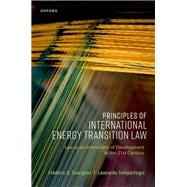
Principles of International Energy Transition Law
by Sourgens, Frédéric G.; Sempertegui, LeonardoBuy New
Rent Textbook
Rent Digital
Used Textbook
We're Sorry
Sold Out
How Marketplace Works:
- This item is offered by an independent seller and not shipped from our warehouse
- Item details like edition and cover design may differ from our description; see seller's comments before ordering.
- Sellers much confirm and ship within two business days; otherwise, the order will be cancelled and refunded.
- Marketplace purchases cannot be returned to eCampus.com. Contact the seller directly for inquiries; if no response within two days, contact customer service.
- Additional shipping costs apply to Marketplace purchases. Review shipping costs at checkout.
Summary
Principles of International Energy Transition Law introduces the energy transition problem by situating the climate emergency in its broader energy and development context, showing how global energy value chains are deeply enmeshed in and drive global economic and human development. It combines the different legal perspectives in one consistent analysis by outlining their interactions and showing how they can be reconciled. The book discusses thirty-two international legal principles governing different aspects of the energy transition trilemma's three parts. It then uses a commons governance perspective to propose a holistic approach to applying and balancing these different parts and their different legal principles.
Highlighted sections summarise the most important concepts and ideas for easy reference, making the title particularly accessible for students and policy-makers as well as law practitioners.
Author Biography
Frédéric G. Sourgens, James McCulloch Chair in Energy Law, Tulane University Law School,Leonardo Sempertegui, General Legal Counsel, Organization of the Petroleum Exporting Countries
Frédéric G. Sourgens is the James McCulloch Chair in Energy Law at Tulane University Law School. Previously, he taught law at Washburn University. He serves on the Executive Council of the American Society of International Law (ASIL), and the boards of the American Branch of the International Law Association (ABILA) and the Center for American and International Law (CAIL ex officio). He is Vice Chair of the Institute for Energy Law (IEL) and Chair of the Southwest Institute for International and Comparative Law (SWIICL).
Leonardo Sempertegui teaches energy transition law and policy at Georgetown Law Center (Washington, DC). He has served as general legal counsel at the Organization of the Petroleum Exporting Countries (OPEC) since 2018 and has extensive experience as a legal and policy advisor for governments, private corporations, international organizations, academia, and NGOs. He is a member of the Board of the Association of Energy International Negotiators (AIEN), and served in several capacities on committees for the American Bar Association (ABA) and International Bar Association (IBA).
Table of Contents
Part I The Legal & Institutional Framework
1. What Is Energy Transition?
2. Why Energy Transition
3. How Can Energy Transition Take Place
4. Governance of Energy Transition Policies
5. International Law Making and Fragmentation
6. Polycentricity, Fragmentation, and the Energy Trilemma
Part II The Energy Transition Principles
7. The Climate Principles
8. The Energy Equity Principles
9. The Energy Security Principles
10. The Environmental Sustainability Principles
11. Community and Indigenous Rights Principles
12. Conflict and Convergence of Energy Transition Principles
Part III Implementing the Energy Transition Principles
13. Due Diligence
14. Stakeholder Engagement
15. Liability & Dispute Settlement
An electronic version of this book is available through VitalSource.
This book is viewable on PC, Mac, iPhone, iPad, iPod Touch, and most smartphones.
By purchasing, you will be able to view this book online, as well as download it, for the chosen number of days.
Digital License
You are licensing a digital product for a set duration. Durations are set forth in the product description, with "Lifetime" typically meaning five (5) years of online access and permanent download to a supported device. All licenses are non-transferable.
More details can be found here.
A downloadable version of this book is available through the eCampus Reader or compatible Adobe readers.
Applications are available on iOS, Android, PC, Mac, and Windows Mobile platforms.
Please view the compatibility matrix prior to purchase.
